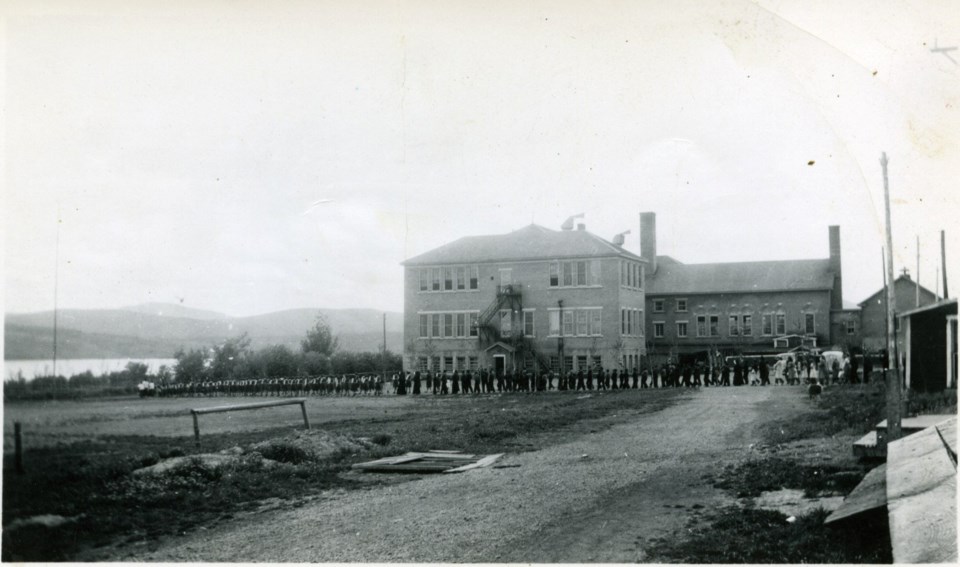On Friday, Pope Francis met with First Nations, Inuit and Metis delegates at the Vatican and offered a formal apology for the harm done by Catholic-run residential schools in Canada.
For at least 10 students at the Lejac Indian Residential School and Cariboo-St. Joseph’s Indian Residential School, that harm came at the hands of Edward Gerald Fitzgerald. The Roman Catholic Church operated the Lejac school near Fraser Lake, B.C. from 1922 to 1976 and Cariboo-St. Joseph’s near Williams Lake, B.C. from 1890 to 1981.
In 2003, the RCMP Native Indian Residential School Task Force charged Fitzgerald, then 77 years old, with 10 counts of indecent assault, three counts of gross indecency, two counts of buggery and six counts of common assault against 10 male students at the two schools. North District RCMP spokesperson Cpl. Madonna Saunderson said the investigation remains open.
“He… is believed to have been residing in Ireland, and there is no extradition agreement in place,” Saunderson said in an email on Friday. “The investigation remains open pending confirmation of Fitzgerald’s death, at which time it will be closed. We have been making those enquiries, and his current status is not known. If Fitzgerald had ever attempted to return to Canada, he would have been arrested on the outstanding Canada-wide warrants.”
Fitzgerald was a boy’s dormitory supervisor at Lejac and Cariboo-St. Joseph’s between 1965 and 1973. If he is still alive, he would be roughly 96 years old.
On Sept. 4, 2006 the Independent newspaper reported that Fitzgerald was living with family members in the “plush, leafy” Dublin suburb of Sandymount, after having moved back to Ireland in 2002. Fitzgerald emigrated to Canada from Ireland in the late 1950s and returned shortly after being interviewed by the RCMP, the Independent reported.
The RCMP had alerted Interpol about the warrant for his arrest and tried to persuade Fitzgerald to return voluntarily to face charges, the Independent reported, but Fitzgerald refused. He was 81 years old at the time.
An Edward Fitzgerald, roughly matching Fitzgerald's age, is buried in Glasnevin Cemetery in central Dublin, according to cemetery documents. Genealogical documents obtained by the Citizen from the Dublin Cemeteries Trust say Fitzgerald died at the age of 93 on Aug. 5, 2019. Cemetery records list Fitzgerald as a pensioner and widower, whose last known address was a tidy brick townhouse in an upscale west Dublin neighbourhood. The Citizen could not independently confirm if the man buried in Glasnevin is the same as the man wanted by the RCMP. No other Edward Fitzgerald's matching his age were listed in the Dublin Cemeteries Trust's records.
The charges against Fitzgerald were the result of the work done by RCMP Native Indian Residential School Task Force, created in December 1994. In addition to a team of RCMP investigators, the task force employed a private civilian researcher who specialized in First Nations and missionary history.
Between 1994 and 2003, the task force interviewed 376 victims about 515 alleged sexual offences and 435 allegations of physical assault.
“In total, 330 victims were identified along with 180 suspects and there were 148 convictions for sexual assault and 11 for physical assault. (One-third) of all the suspects were determined to be deceased,” Saunderson said in an email. “(A) total of 14 individuals were charged with various offenses since the first allegations were made to police in 1989. One of the last major tasks the NIRS task force investigators did was travel to Thailand to bring an accused and charged supervisor, of a residential school in the ‘60s, back to Canada to stand trial.”
The task force investigated allegations of abuse at 15 residential schools in the province, including Lejac and Cariboo-St. Joseph’s.
“The investigation was one of the largest and most difficult sexual assault investigations in B.C. history,” Saunderson said. “A special protocol was established between various Indigenous leaders, B.C. Attorney-General Ministry, the RCMP, and representatives from the federal government which established ground rules for this specific investigation. The protocol was signed in advance of the launching of NIRS and ensured that it was a victim-driven investigation in which the police would not be seeking out potential victims, and every victim had the option to make a disclosure to the Task Force only to choose not to proceed with a criminal prosecution. A Crown Counsel was appointed to coordinate all NIRS prosecutions throughout B.C.”
- With files from The Canadian Press



